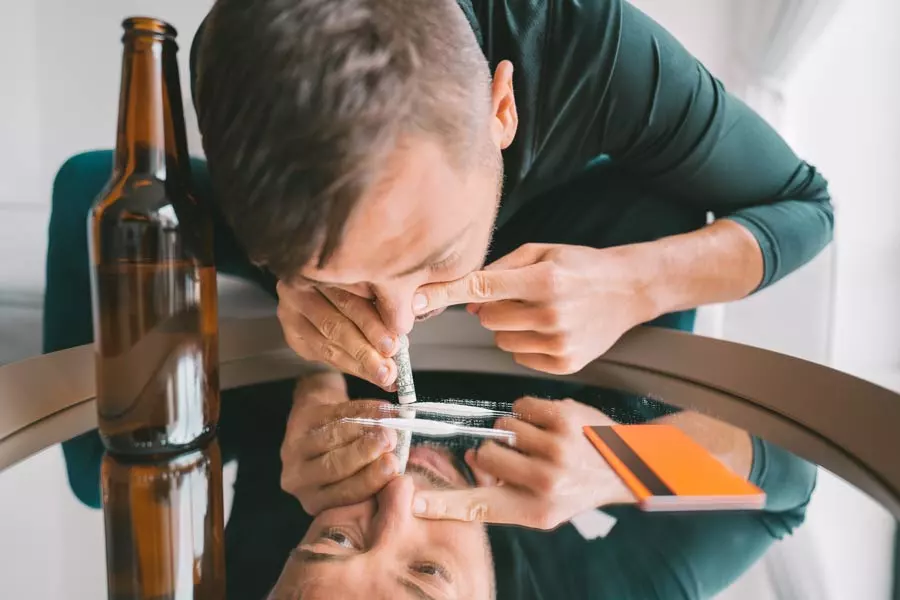The Impact of Cocaine’s After-Effects on Your Addiction Risks
The stimulant street drug cocaine affects your system in a variety of ways. Most of the people who use the drug are seeking its euphoric, stimulant effects. However, those effects fade quite rapidly. This is true because cocaine does not stay in your system for long. When the drug has left your body, you will likely experience a number of unpleasant sensations. Together, these sensations are known as a cocaine crash or cocaine comedown. Another term, cocaine hangover, describes essentially the same phenomenon.
A cocaine comedown is not a trivial thing. Instead, it can play a significant role in the eventual onset of cocaine addiction. Why? Many people seek to avoid the effects of a comedown by using more of the drug. When repeated again and again, this cycle of excessive use can speed up the pace of a developing addiction. As a result, it can also hasten your need for an effective cocaine treatment program.
What Are the Effects of Cocaine
The effects of cocaine are similar to those of other stimulant drugs. All drugs in this category increase the baseline level of activity in your central nervous system. They also typically produce the extremely pleasurable feeling known as euphoria.
Cocaine also has a range of other short-term effects. The list of those effects includes mental and physical changes such as:
- Narrowing of your blood vessels
- An increase in your normal blood pressure
- Spikes in your heart rate and body temperature
- Pupil dilation
If you consume heavy amounts of cocaine, the drug may produce some additional, unpleasant mental effects. Potential examples of these psychological alterations include:
- Violent outbursts
- Bouts of panic
- Behavior that is erratic or out of character
- Paranoid behavior
- Anxiousness, irritability and/or restlessness
Heavy cocaine use may also lead to physical health issues such as vertigo and trembling or twitching muscles.
What Are the Signs of a Cocaine Comedown

A cocaine comedown or crash has an impact that is mostly psychological. Possible signs or symptoms of a comedown include:
- An inability to feel pleasure
- Feelings of irritability and anxiousness
- Powerful urges to use more cocaine
- A drop in your normal energy levels
- Unusual sleepiness
While coming down from the drug, you may also feel paranoid or agitated.
What Is the Cocaine Comedown Timeline
Not everyone who crashes after using cocaine goes through the exact same experiences. However, there is a typical cocaine comedown timeline. If you nasally inhale the drug, it will produce its characteristic euphoria for roughly 15 minutes to half an hour. If you smoke the drug, its high lasts for just a few minutes. A comedown can begin shortly after the drug leaves your system. You may continue to feel its effects for a number of hours.
If you are addicted to cocaine, the comedown period may be followed by symptoms of withdrawal. Some of these symptoms overlap with those of a crash. Others differ substantially. All told, common indicators of cocaine withdrawal include such things as:
- Depression
- Malaise, i.e., a general feeling of unease
- Nightmares
- Continued cravings for more of the drug
- Loss of energy
- Restlessness and agitation
- A slowdown in your normal rate of physical and mental activity
Most of the symptoms of withdrawal fade in a matter of days. However, if you have a long history of heavy cocaine use, you may continue to feel depressed for months. Your cravings for the drug may also linger for a similar amount of time.
Who Suffers From a Cocaine Comedown

No one who uses cocaine is immune to a crash or comedown. It can happen to you the first time you use the drug. It can also happen at any other time thereafter. The more you use cocaine, the worse your comedown symptoms may become. They may also grow worse if you use the drug heavily.
Cocaine Jaw and Bruxism in Cocaine Users
If you use cocaine, you can develop a condition called bruxism. People affected by this condition clench and/or grind their teeth without realizing it. Potential symptoms of bruxism include:
- Wearing away of the surfaces of your affected teeth
- Tension in the muscles of your jaw and face
- Headache
- A locked jaw
- Cracking or chipping of your teeth
- Pain in your jaw area
- A dislocated jaw
- Cuts or sores on the side of your mouth
When bruxism is the result of cocaine use, it is sometimes known as cocaine jaw.
Cocaine Comedown, Cocaine Binging and Addiction Risks
Some people who use cocaine end up binging on the drug. This behavior is typically characterized by doing several things in a short span of time. These things include:
- Using heavy amounts of the drug
- Not taking any breaks while using the drug
- Only stopping when there is no cocaine left or you are physically forced to quit
There are several possible motives for going on a cocaine binge. In many cases, the motive is a desire to avoid coming down from the drug.
If you binge on cocaine, you can easily increase your risks for addiction. Why is this the case? Regular, heavy use is a known factor in the development of physical drug dependence. If you keep using cocaine, you may also become emotionally dependent on it. In addition, you may feel an involuntary need to find and take more of the drug. Physical dependence, emotional dependence and involuntary drug-seeking combine to create cocaine addiction.
Recovering From a Cocaine Comedown
A cocaine crash can be profoundly unpleasant. In response to the experience, it is tempting to try to minimize its effects so you can keep using the drug. However, the point is not finding tips to recover from too much cocaine the night before. The only way to completely avoid a cocaine comedown is to stop using the drug.
Using a Cocaine Crash and Cocaine Hangover to Get Sober
Recurring exposure to cocaine crashes is often a compelling motivation for getting sober. That can be especially true if your crashes are followed by cocaine withdrawal. Whatever your reason for wanting to get sober, it is crucial that you follow up on this intention. That is the only way to avoid getting addicted. And if you are already addicted, it is the only way to restore your sobriety and well-being.
How Can Cocaine Binges Be Treated Effectively

If you regularly binge on cocaine, there is a good chance that you meet the criteria for stimulant use disorder. All people with this disorder have life-disrupting problems related to stimulant use. These problems may lead to a diagnosis of addiction. They may also result in a diagnosis of damaging, non-addicted stimulant abuse. In addition, you may have a mixture of diagnosable addiction and abuse symptoms.
Whichever of these scenarios apply to you, you need the specialized help provided by professional cocaine treatment. If you are addicted to cocaine, the first task is usually completing a stimulant detox program. In detox, you will receive support that helps you weather the effects of cocaine withdrawal. When the process is complete, the drug will be out of your system.
Detox alone is not sufficient treatment for cocaine addiction. It serves a crucial purpose by helping you reach initial sobriety. But as a rule, that sobriety is extremely difficult to maintain unless you receive further recovery support.
This support is provided in primary cocaine treatment. Behavioral psychotherapy forms the core of modern treatment programs for stimulant problems. Three forms of this therapy are especially helpful for people in cocaine programs:
- Contingency management
- Community reinforcement plus vouchers
- Cognitive behavioral therapy, or CBT
Contingency management and community reinforcement use reward systems to help you stay motivated during treatment. CBT teaches you to recognize thoughts, emotions and behaviors that sustain your cocaine use. It also teaches you to cultivate different thoughts, emotions and behaviors that help prevent cocaine use. You may also benefit from 12-step facilitation. This therapy helps you add a support group to your treatment plan.
Seek Help For Cocaine Problems at Best Rehabs In Arizona
A comedown, hangover or crash can happen to anyone who uses cocaine. All of these terms refer to a group of symptoms likely to appear when the drug leaves your system. Comedown symptoms can be extremely unpleasant. To avoid them, some people go on binges of heavy cocaine use. Binging can make your eventual comedown symptoms worse. Recurring binges also increase your chances of developing the symptoms of cocaine addiction.
You can escape the cycle of binging and addiction by seeking help for your cocaine problems. Detox is a common starting point for an effective recovery. Successful completion of detox forms a basis for primary cocaine treatment. Behavioral therapy is the modern standard for cocaine rehab programs. Several forms of this therapy may play a role in an effective treatment plan.
At Best Rehabs In Arizona, we offer extensive resources for cocaine recovery. Those resources include targeted stimulant detox. They also include both inpatient and outpatient options for a follow-up treatment program. In addition, Best Rehabs In Arizona provides specialized help for addiction that occurs alongside other mental health issues. To find out more about our options for cocaine treatment, contact us today.

